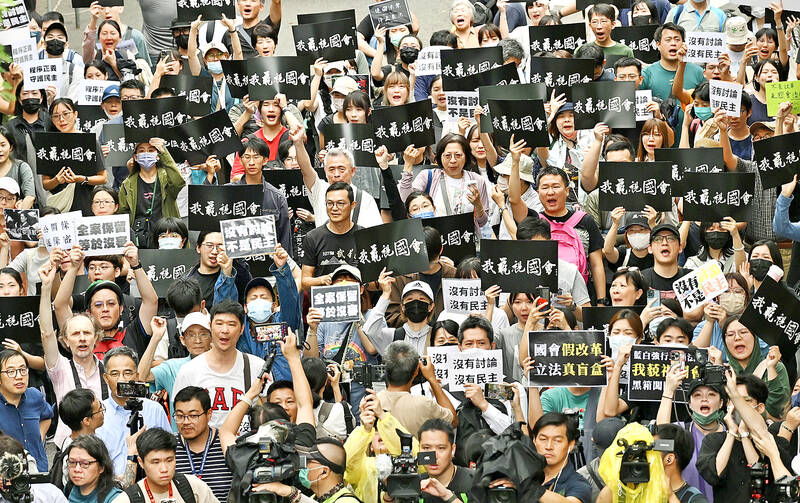People rally in Taipei against pro-China bill
With most seats in parliament, opposition Kuomintang and Taiwan People's Party want to expand the legislature’s right to question government officials, including the president. Some fear that such changes risk curtailing the country's political freedoms in favour of Beijing's aims. Yesterday's protests were inspired by the Sunflower Movement of 2014.
Taipei (AsiaNews) – Lai Ching-te's presidency began with a series of protests against pro-Chinese opposition parties.
Yesterday, from 9 am until midnight, about 30,000 people gathered outside parliament to express their opposition to a bill that aims to enhance legislative control over the executive.
Kuomintang Members of the Legislative Yuan (Taiwan’s parliament) started approving amendments without reviewing them in committee as required by standard procedure, a move that sparked a fresh row in parliament after a violent confrontation last Friday, when the bill was debated for the first time.
For President Lai, who took office on Monday, the situation is complicated since he lacks a working majority in parliament after winning 40 per cent of the vote.
In the 13 January elections, the president’s Democratic Progressive Party (DPP) won only 51 out the 113 seats, while the opposition Kuomintang took 52 and the Taiwan People's Party elected eight. Both opposition parties agree on enhancing parliament’s powers.
The controversial reform bill, among other things, would allow the legislature to summon private individuals and government officials, including the president, to appear before parliament for questioning. Failure to appear could result in criminal charges of "contempt of the legislature,” with up to three years in prison if convicted.
People appearing before parliament would be obliged to reveal confidential matters, such as state secrets concerning diplomatic agreements, trade secrets, and military purchases.
The bill also bans reverse questions, with fines of up to 200,000 Taiwanese dollars (US$ 6,200).
DPP supporters fear that the Kuomintang could use these changes to target its political opponents and force them to reveal confidential information that might endanger national security.
Similarly, the opposition is proposing that the president deliver an annual address to parliament at least once a year (it is currently optional) but above all, it wants to invest US$ 61 billion in infrastructure, a figure that risks blocking further defence spending.
Under President Tsai Ing-wen, Taiwan boosted its military budget to billion to deter mainland China from attacking.
Lai has so far followed his predecessor. In his inaugural address he highlighted his intention to maintain the status quo vis-à-vis Beijing, pledging additional funds for defence.
So far, the new president has not yet directly weighed in on the issue debated in parliament, choosing to keep some distance from the protests, probably, according to analysts, to avoid the perception that they were orchestrated by the DPP.
In yesterday’s demonstrations, several civic groups cited the Sunflower Movement of 2014, when hundreds of thousands of people occupied the Legislative Yuan (Taiwan's parliament) for a month to protest a free trade agreement with China that the Kuomintang, then in power, hoped to approve without submitting it to regular committee review.
In the end, the movement, fearing that the agreement would have repercussions on Taiwan's political freedoms, forced the Kuomintang to scrap the deal.
As for the current crisis, further protests are planned for 24 and 28 May when the bill goes before parliament again.
12/01/2024 18:35
23/01/2023 15:38







.png)










